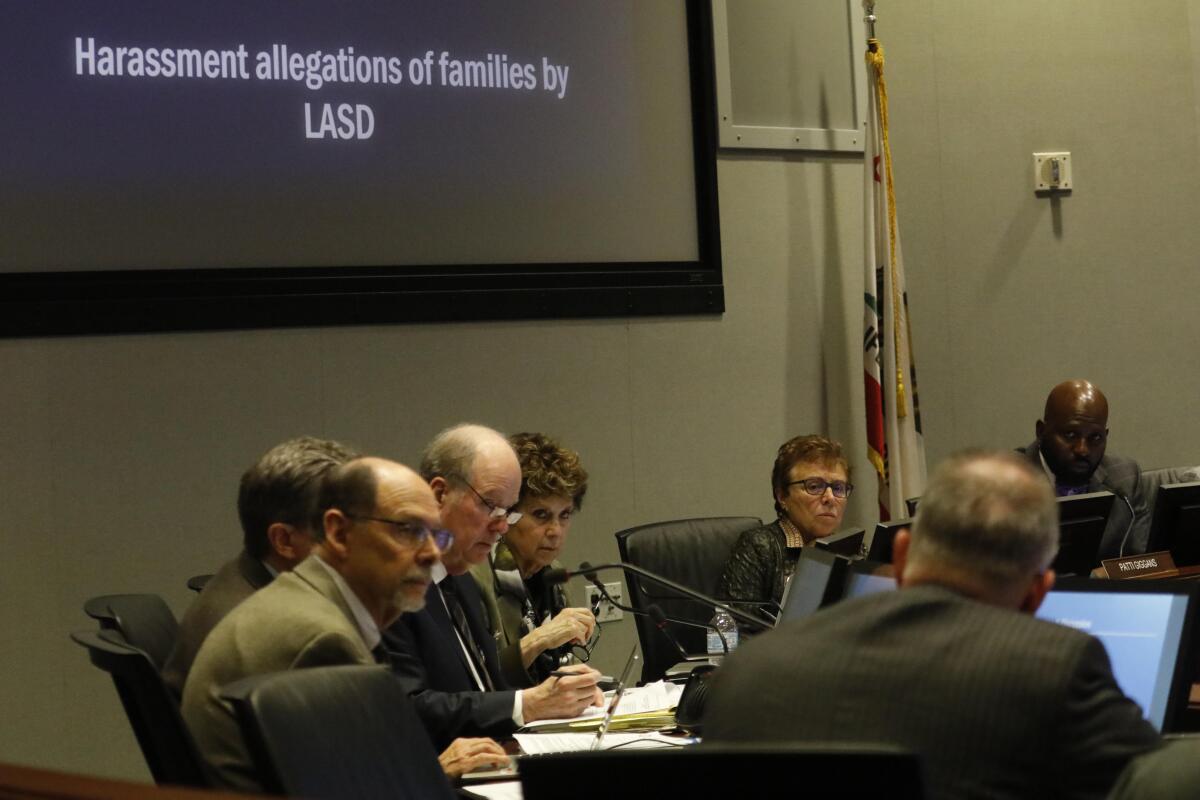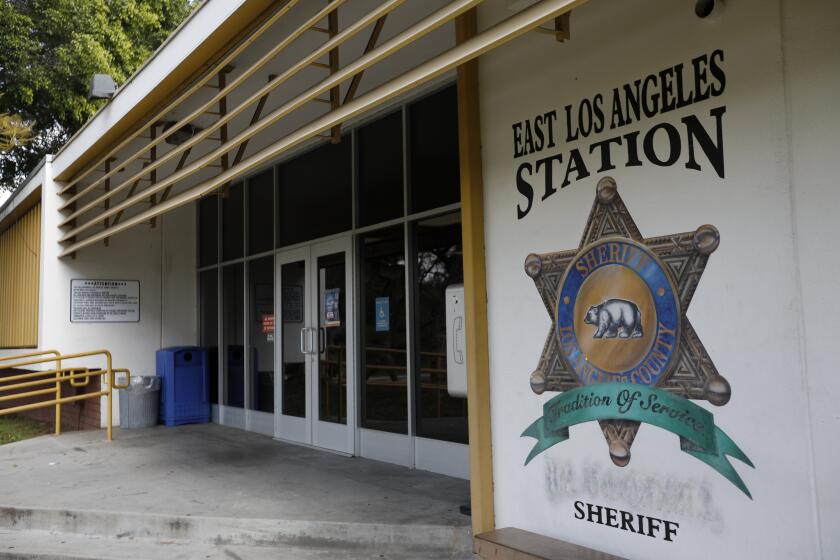L.A. County panel launches investigation into Sheriff’s Department ‘deputy gangs’

- Share via
The civilian commission that oversees the Los Angeles County Sheriff’s Department is launching an independent investigation into “deputy gangs” that have been entrenched within the agency for decades.
The move represents a major step in efforts to scrutinize the groups, which a succession of elected sheriffs have failed to root out despite members being linked to allegations of violence and corruption.
The investigation will be conducted by a team of heavyweight attorneys working pro bono, including at least six former federal prosecutors and two former federal public defenders, Sean Kennedy, chair of the Sheriff Civilian Oversight Commission, told The Times.
“The sheriff has repeatedly challenged anyone to come up with the evidence of deputy gangs, and our intention is to conduct a completely independent investigation,” said Kennedy, a Loyola Law School professor and former head of the Central District federal public defender’s office.
The team will be led by Bert Deixler, a former federal prosecutor who has testified before California lawmakers on the constitutionality of racial segregation in prisons.
Deixler said the team has already begun interviewing people confidentially and has “good reason” to believe that the state law banning law enforcement gangs is being violated.
“We’re hearing that these groups are exclusionary in membership,” Deixler said. “They are actively operating in furtherance of developing and executing power by preferring their members (and) engaging in retaliatory acts against people who are outside their circle.”
Deixler said he expects to conduct public hearings within a month and intends to ask deputies if they have tattoos, which can be a signifier of membership in the groups.
“We’ll hear the circumstances of how they got a tattoo, how they were invited to get a tattoo, what it all means,” he said. “Maybe there’s some positive, appropriate, rah-rah fraternity piece to it. But maybe there’s much more nefarious explanations as well. ... We’ll run that to ground and find out why you want to have an Executioner tattoo.”
The Times first reported in 2018 on the Executioner group operating out of the Compton sheriff’s station. A deputy admitted under oath to having a tattoo on his calf depicting a skull with a rifle and a military-style helmet emerging from flames. The letters “CPT,” for Compton, appeared on the helmet.
This week, Inspector General Max Huntsman said his office has compiled a partial list that includes 30 alleged Executioners and 11 deputies who allegedly belong to the Banditos, which operate out of the East L.A. sheriff’s station.
Kennedy said the lawyers plan to subpoena witnesses to testify under oath. The goal is to find out in the next six months where the groups operate in the Sheriff’s Department and what impact they have on policing.
In the past, Sheriff Alex Villanueva and his staff have resisted the commission’s subpoenas by either challenging them in court or failing to show up to meetings to which they were summoned. The Sheriff’s Department did not answer questions from The Times about whether it would comply with the commission’s investigation or encourage deputies to participate.
Villanueva, who faces a crowded field of challengers looking to unseat him in the June primary, said in a statement Thursday that the new panel is a “fishing expedition” and “political theater.”
The Sheriff’s Department said in a statement Thursday: “The timing is obvious, and these political appointees are using their official capacity to regurgitate the same old stale allegations, with absolutely no new evidence, in an effort to hopefully influence the outcome of an election.”
‘Ghost guns,’ inking parties and a decades-long struggle to crack down on cliques within the Sheriff’s Department
The panel’s investigation will assess whether internal policies have been effective in combating the groups and make recommendations on how to root them out of the roughly 18,000-member department, which runs the county jails and patrols streets in unincorporated areas and contract cities.
“This issue has been languishing for over 50 years,” said Kennedy, who authored a 2021 report that found that since the 1970s there have been 18 deputy cliques within the Sheriff’s Department, some of which remain active. “Our intention is to move forward immediately.”
The investigation will be similar to that of the Citizens’ Commission on Jail Violence, which was appointed by the Board of Supervisors about a decade ago to examine allegations of abuse and beatings of inmates by deputies in L.A. County jails. Deixler was also a lead attorney in the jail violence investigation and has served on other police reform panels.
Miriam Krinsky, a former federal prosecutor who served as executive director of the jail violence panel commission, said the problems with the deputy groups have been ignored for far too long.
“It creates a culture and a starting point that is willing to tolerate a loyalty to subgroups rather than to the mission of the department overall,” said Krinsky, a onetime advisor to former Sheriff Jim McDonnell. “The job becomes about protecting each other and having the backs of colleagues, no matter what they may do.”
She said that to achieve meaningful reform, the county supervisors need to be willing to change civil service rules to keep problematic deputies off the force, something she said they have resisted in the past.
“There needs to be harsh action taken against individuals pledging allegiance to subgroups,” she said. “There needs to be a long, hard look at tattoo policies. ... There needs to be leadership from the very top that makes sure, makes crystal clear that it’s unacceptable.”
The jail violence panel flagged the deputy groups as among the contributors to violence in the county lockups. The panel’s work resulted in the formation of the oversight commission in 2016, after multiple indictments of sheriff’s deputies, including former Sheriff Lee Baca and Undersheriff Paul Tanaka.
Oversight commission members are appointed by the supervisors, with five nominated by the supervisors and the other four recommended by community groups.
A new study finds that 16% of L.A. County Sheriff’s deputies and supervisors said in an anonymous survey they’ve been asked to join a secret clique.
Much of what has previously been known about the deputy groups, whose members often get matching tattoos, comes from allegations and testimony in lawsuits.
A lawsuit filed in 2019 by several deputies alleges that the Banditos repeatedly denied them backup on dangerous calls, pressured them to quit or leave the station and sent hostile messages on work computers. It also alleges that the Banditos once secretly removed ammunition from another deputy’s shotgun.
In September 2018, two deputies were knocked unconscious at a department party at an event space called Kennedy Hall, the lawsuit says. The incident was the focus of two internal Sheriff’s Department investigations — one of which Villanueva has said led to the discipline of 26 employees — as well as a report by the Office of Inspector General that found the Banditos are “gang-like and their influence has resulted in favoritism, sexism, racism and violence.”
A Rand Corp. study commissioned by L.A. County found last year that 16% of the 1,608 deputies and supervisors who anonymously answered survey questions had been invited to join a clique, with some invitations having come in the last five years. More than a third of respondents said the groups should be prohibited.
But some criticized the report for offering an incomplete portrayal of the problem because deputies were not compelled to participate in the survey and only about 1 in 6 deputies responded. Those who did participate were not asked if they ever belonged to a group.
Top watchdog for the L.A. County Sheriff’s Department has identified dozens of deputies who are allegedly members of gang-like groups that operate out of two stations.
Villanueva has downplayed the problems with the groups but has also taken credit for addressing them by instituting a policy that prohibits deputies from joining groups that promote behavior violating the rights of others.
More to Read
Sign up for Essential California
The most important California stories and recommendations in your inbox every morning.
You may occasionally receive promotional content from the Los Angeles Times.













